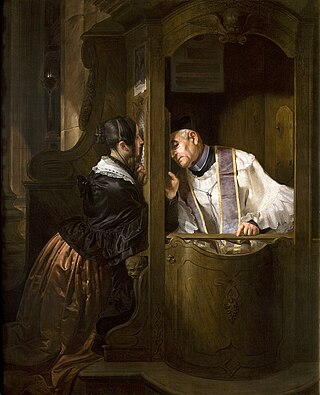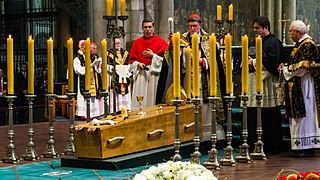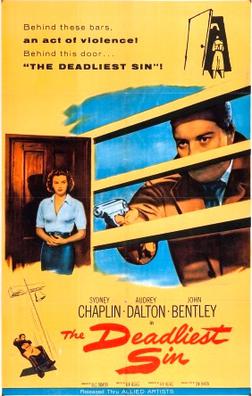
Confession, in many religions, is the acknowledgment of sinful thoughts and actions. This may occur directly to a deity or to fellow people.

Penance is any act or a set of actions done out of repentance for sins committed, as well as an alternate name for the Catholic, Lutheran, Eastern Orthodox, and Oriental Orthodox sacrament of Reconciliation or Confession. It also plays a part in confession among Anglicans and Methodists, in which it is a rite, as well as among other Protestants.

A mortal sin, in Christian theology, is a gravely sinful act which can lead to damnation if a person does not repent of the sin before death. It is alternatively called deadly, grave, and serious; the concept of mortal sin is found in both Catholicism and Lutheranism. A sin is considered to be "mortal" when its quality is such that it leads to a separation of that person from God's saving grace. Three conditions must together be met for a sin to be mortal: "Mortal sin is sin whose object is grave matter and which is also committed with full knowledge and deliberate consent." The sin against the Holy Spirit and the sins that cry to Heaven for vengeance are considered especially serious. This type of sin is distinguished from a venial sin in that the latter simply leads to a weakening of a person's relationship with God. Despite its gravity, a person can repent of having committed a mortal sin. Such repentance is the primary requisite for forgiveness and absolution.

Absolution is a theological term for the forgiveness imparted by ordained Christian priests and experienced by Christian penitents. It is a universal feature of the historic churches of Christendom, although the theology and the practice of absolution vary between Christian denominations.
In the Catholic Church, the Seal of Confession is the absolute duty of priests or anyone who happens to hear a confession not to disclose anything that they learn from penitents during the course of the Sacrament of Penance (confession). Even where the seal of confession does not strictly apply – where there is no specific serious sin confessed for the purpose of receiving absolution – priests have a serious obligation not to cause scandal by the way they speak.

The Confiteor is one of the prayers that can be said during the Penitential Act at the beginning of Mass of the Roman Rite in the Catholic Church. It is also said in the Lutheran Church at the beginning of the Divine Service, and by some Anglo-Catholic Anglicans before Mass.

The Penitential Act is a Christian form of general confession of sinfulness that normally takes place at the beginning of the celebration of Mass in the Roman Rite of the Catholicism, as well as in Lutheranism. In Anglicanism, it is said as part of the Eucharist, but it is not considered an official sacrament.
The Sacrament of Penance is one of the seven sacraments of the Catholic Church, in which the faithful are absolved from sins committed after baptism and reconciled with the Christian community. During reconciliation, mortal sins must be confessed and venial sins may be confessed for devotional reasons. According to the dogma and unchanging practice of the church, only those ordained as priests may grant absolution.
Queen Elanor's Confession or Queen Eleanor's Confession is a traditional English-language folk ballad. Although the figures are intended as Eleanor of Aquitaine, Henry II of England, and William Marshal, the story is entirely fictional.
A confession is an acknowledgement of fact by one who would have otherwise preferred to keep that fact hidden.
Lay confession is confession in the religious sense, made to a lay person.

Absolution of the dead is a prayer for or a declaration of absolution of a dead person's sins that takes place at the person's religious funeral.

Absolution is a 1978 British thriller film directed by Anthony Page and written by playwright Anthony Shaffer. The film stars Richard Burton as a priest who teaches at a boys' school and finds one of his favourite students is playing a nasty practical joke on him. He sets out to investigate the prank and stumbles upon a dead body, leading to his life spiralling out of control. The film also stars Dai Bradley, Dominic Guard and the Scottish comedian Billy Connolly, in his debut film role.

In the Lutheran Church, Confession is the method given by Christ to the Church by which individual men and women may receive the forgiveness of sins; according to the Large Catechism, the "third sacrament" of Holy Absolution is properly viewed as an extension of Holy Baptism. Unlike Roman Catholicism, the practice of private confession in the Lutheran Church is voluntary, not obligatory.

Into Temptation is a 2009 independent drama film written and directed by Patrick Coyle, and starring Jeremy Sisto, Kristin Chenoweth, Brian Baumgartner, Bruce A. Young and Amy Matthews. It tells the story of a sex worker (Chenoweth) who confesses to a Catholic priest (Sisto) that she plans to kill herself on her birthday. The priest attempts to find and save her, and in doing so he plunges himself into a darker side of society.

Tanel Toom is an Estonian director and screenwriter.

The Confession is a 10-part web series created by Kiefer Sutherland, written and directed by Brad Mirman, and starring Sutherland and John Hurt. It premiered on Hulu on March 28, 2011. Each episode is between five and seven minutes long. It co-stars Daniel London, Max Casella, and Michael Badalucco.

Confession, released in the United States as The Deadliest Sin, is a 1955 British drama film directed by Ken Hughes and starring Sydney Chaplin, Audrey Dalton and John Bentley.

Kamaal Dhamaal Malamaal is a 2012 Hindi-language comedy drama film directed by Priyadarshan. It stars Nana Patekar, Paresh Rawal, Om Puri, Asrani, Shreyas Talpade, Shakti Kapoor and Nyra Banerjee. The film has been produced by Percept Picture Company. The story is adapted from Malayalam film Marykkundoru Kunjaadu written by Benny P. Nayarambalam. It was released on 28 September 2012. This film is the reboot of the 2006 comedy film Malamaal Weekly.
"Mari Kelenn" is a Breton gwerz extant in only two 19th-century versions. The song tells the story of a young woman who is abused by her father and bears him seven children, all of whom she kills. For penance, she is locked in a chest for one year or for seven years ; in both cases, after the penance is done a piece of her heart is left in the chest, but Mari is gone. The coming of a white dove signifies she is absolved.












